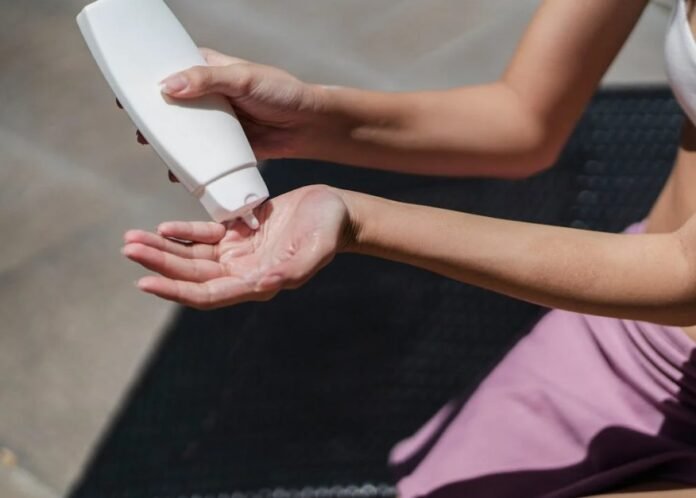Every season of the year comes with different environmental conditions that can affect your skin one way or another. Therefore, if you want to take the best possible care of your skin, you need to tweak your routine a little according to the season.
Here, we will give you some summer skincare tips that will help your skin cope better with the hottest months of the year and, why not? make it look more radiant during the whole summer.
In our opinion health and beauty go hand in hand, thus these summer skincare tips from dermatologists won’t be only focusing on skin beauty. Some of them are destined to remind you of basic skin health tips that people often don’t know or just forget with time.
1. Check Your Moles
One in a while, especially if you are a beach addict, it is recommended to visit your dermatologist and get a full-body exam. Your doctor will examine your moles and marks and see how they evolve over time, so you will know how careful you should be with sun exposure, according to your specific skin condition. Knowing that you are melanoma-free will make you feel safer and enjoy more the summer. Moreover, keeping those moles in check will prevent having problems in this regard in the future.
Always visit your dermatologist if a mole changes its aspect or grows bigger.
2. Meet the SPF Minimums
Telling you that you should wear sunscreen in summer may seem obvious but knowing the minimum SPF required to prevent skin problems is not that easy.
While according to FDA (Food and Drug Administration) SPF 15 is the minimum you should wear to prevent skin cancer, both the European Academy of Dermatology and Venerology (EADV) and the American Academy of Dermatology (AAD) recommend SPF 30 or higher.
Besides, in order to prevent dark patches and skin photoaging, our advice is to use SPF 50+ during summer every time you are exposed, not only when you are on the beach.
3. Apply Sunscreen 30 or 15 min Before Sun Exposure and Reapply Every 2 Hours
You should always apply your sunscreen before sun exposure to give it time to penetrate the skin and create that invisible shield that is going to protect you.
Also, SPF numbers are tested on how sunscreen protects for 2 hours, so there is no guarantee of the cream being as much effective after that time.
In addition, we recommend reapplying sunscreen after a swim. Most sunscreens are water-resistant nowadays, which means you can stay in the water playing or doing sports for longer without having to worry about skin burn. Nevertheless, once you get back to your towel and the skin has dried, it is better to reapply again in case some of the cream has been washed out.
4. Stay in the Shade
If you spend a day on the beach, bring an umbrella or seek shelter. Sun has some important health benefits but spending hours under it is way too much. If you are spending a long time on the beach, bring an umbrella with you or seek shelter in the beach bar or under a tree. Plus, we are not only worried about sunburn here; if you want to prevent sun-induced wrinkles and dark patches extra care is a must.
5. Moisturize Your Skin after the Beach
Sun exposure, sand, and salty water can highly dehydrate your skin. To compensate for the drying effects of these external elements and bring balance to your skin, we recommend applying a highly moisturizing body lotion and face moisturizer after the shower.
6. Take cool showers
Hot showers can dry your skin more, so it is always better to use warm or cool water for your skin. Besides, cool water is also better for blood flow and skin microcirculation. All in all, turning the water temperature a little bit down has great benefits for the body and skin.
7. Change your clothes after outdoor exercise
Staying in sweaty or wet clothes for a long time creates a bacteria-friendly microenvironment. It can cause skin rashes or even lead to a skin condition called folliculitis, in which the skin follicles get infected and cause inflammation and red pimples around the follicle. Preventing folliculitis is as easy as changing and washing your clothes after sweaty physical activity.
8. Revitalize your skin once a week
Revitalizing masks are great tools for restoring skin balance, bring extra moisture, and enhance skin elasticity. Choose a mask that helps to repair and strengthen the skin barrier. Remember that the skin barrier helps to keep the skin balance and protects it from external stressors, including bacteria, pollution, ROS, etc. Your skin barrier can weaken due to excessive sun exposure, so boosting its recovery by using a mask once a week will improve your skin defenses, texture, and appearance.
9. Use antioxidants
UV radiation is an important source of Free Radicals. These feared elements damage our tissues and cause premature skin aging. To help your skin protect from their damaging effects, you can add antioxidants to your diet and skincare regime. All foods rich in vitamin C will provide your body with antioxidants. Its cosmetic form, Ascorbic Acid, will do the trick as well; it will go directly to your skin, so it will be more specific to prevent photoaging. Specific serums and free-radical scavenging peptides can be very helpful. When it comes to preventing Oxidative Stress, every precaution must be taken. Using antioxidants can significantly slow down skin aging.
10.Repair your skin after sun damage
Wait for the fall to follow this tip. If you have been extra careful, probably summer hasn’t damaged your skin a bit, but it sounds very utopic. Usually, after summer we find out that our complexion is uneven and the skin drier than normal. So, fall is a great time to go for a facial, enjoy a soft peel to renew your skin and fade those dark spots. Let your aesthetic doctor pamper your skin once the beach days are over!


